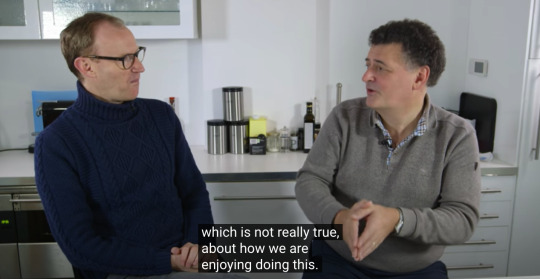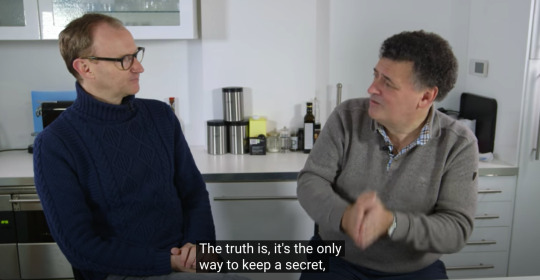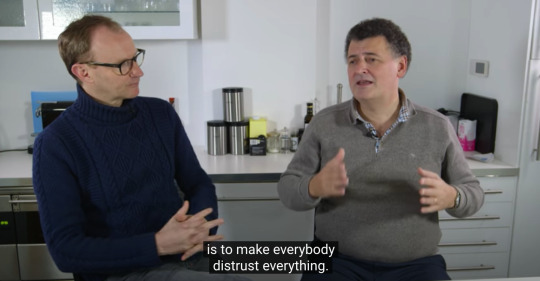Sherlock. Setlock. Meta. TJLC. Post Grad. History Major. Heritage Studies. If you're getting notifications from fallingforthevillain that's me. We're through the looking glass here, people.
Don't wanna be here? Send us removal request.
Text
Okay so I’m not denying Mary Morstan’s existence as a character in the ACD canon, but because she’s barely ever mentioned, what if Watson…made her up? Or not Mary Morstan specifically but made up having a wife? The reason being because he didn’t want people to be suspicious of his relationship with Sherlock? (I know there is a lot of discourse on this topic but this is my light-hearted example of how it would work).
Sherlock: So Watson, people believe the whole wife thing?
Watson: Yes, I just have to mention her at the start of every few cases and then everyone thinks she’s there
Sherlock: You haven’t mentioned her a lot recently
Watson: …Yeah sometimes I forget about her
Sherlock: What if you…what if you kill her off?
Watson: That’s a bit extreme
Sherlock: No! Just… Here, say she died from an illness. So you’ve moved back to Baker Street.
Watson: It’s very unspecific
Sherlock: Yes but if she’s dead, people won’t wonder where she’s gone
Watson: …Yeah okay
[A few weeks later]
Sherlock: Watson. Why did you mention your wife?
Watson: …Oh shit yeah
95 notes
·
View notes
Photo

“The Magic trick”
I’m clearly new here, but love seeing all the amazing art and gifs from the fandom. Thanks for all the love on my first Johnlock cartoon, so here is another :) They’re so cute together!
2K notes
·
View notes
Photo
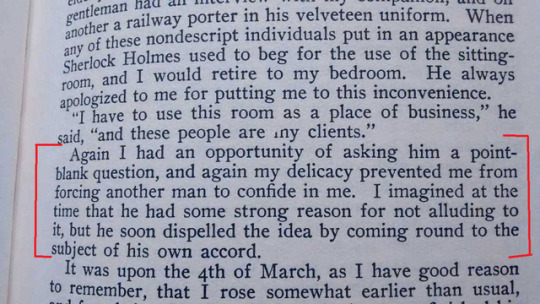
Dr. John “Too Anxious To Ask His Roommate/Crush What He Does For a Living Despite The Fact that He Does It In Their Home and Has Absolutely No Qualms About Involving Other People In It” Watson
106 notes
·
View notes
Text
A Study in Pink sets the stage for all of our future expectations. Nothing in this show is done by accident, and the way it is all handled is masterful. Seeds are sewn in this first episode that will never cease to matter throughout the duration of the show.
Take the first meal Sherlock and John share together at Angelo’s, where Angelo insists that the pair must have a candle for their table:

It seems like sort of a “joke” in a way–something that could easily be brushed off if we didn’t all know that TJLC is real. And the candle thing continues to be a theme. Illumination itself is a subtle theme throughout the show, with all the color-coded lights and the fact that Sherlock dubs John his “conductor of light” in “The Hounds of Baskerville.”
I noticed something recently when watching what is surely one of the favorite scenes of all Johnlockers: the reunion of Sherlock and John at The Landmark in the episode “The Empty Hearse.” This is the night Sherlock returns, supposedly from the dead, and interrupts John’s (rather lackluster) attempt to propose to his girlfriend Mary in a rather half-hearted effort to, in his own words, “move on” from Sherlock.
Notice anything missing from John and Mary’s table?

There’s a lamp, sure, but no candle. Maybe that isn’t terribly unusual. But look at the other tables in the restaurant:
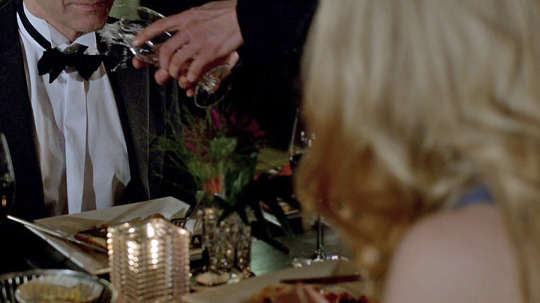

Most have candles.
It doesn’t stop there. When Sherlock catches his first (heart-stopping; you can clearly see that in his face, just as it has been pointed out that if you isolate certain audio tracks in this part here you can hear Sherlock’s thudding pulse) glimpse of John after two years away…
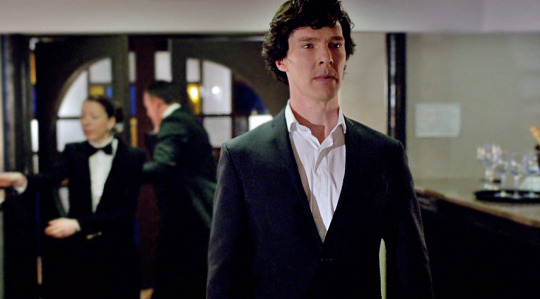
how does he see him?

There is a candle placed strategically between them, clearly visible from Sherlock’s vantage point.

This isn’t the only throwback to Angelo’s on this night. If more is needed, I’m including this little bonus below. The writers have done this *so many times,* where certain words and phrases come back again. It isn’t an accident and it isn’t lazy writing. We’re talking about the combined efforts of two very good writers here, and though John’s nerves on this night aren’t exactly hard to pick up on, we get this cherry strategically placed on top:
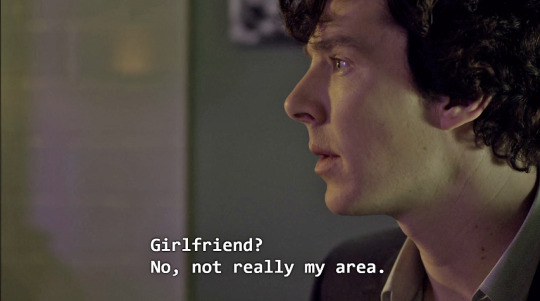

I SUGGEST YOU DON’T MARRY MARY.
How could you do that? Hmm? ;)
6K notes
·
View notes
Text
“who is he” “he’s with me” “but who is he” “i said he’s with me” currently screaming at the fact that sherlock refused to describe his relationship to john in this scene literally “he’s my flatmate” would have been perfectly accurate description, john had already looked at 221b and said yeah this is nice, but he refused!! to limit it to that! he wasn’t sure what they were becoming!! screaming!
582 notes
·
View notes
Text
Time, Space and Sherlock
After the surrealistic ending of BBC Sherlock’s fourth series in 2017, many of us might have asked ourselves: is it even possible to construct a coherent plot line out of this mess? Is it possible to trace some ‘real’, believable story arc for the show; a narrative where things would still make logical sense? Or is the whole show rather a sort of abstract work of art, where everything is to be read metaphorically? Strangely enough, I think both. :)
One of the things that don’t exactly behave normally in BBC Sherlock is time. And this is not limited to S4, but can be found all over the show. We see people perform things that would be highly questionable, or even wouldn’t be physically possible, to do in our real world, considering the time it would take. Like Sherlock and John climbing over rooftops and still arriving in time to shortcut a taxi in ASiP. Or Moriarty in TRF, arriving to have a chat with Sherlock at 221B from having been in custody at The Old Bailey (at least 15 minutes apart with car, according to the maps), basically within the time it takes for Sherlock’s kettle to boil.
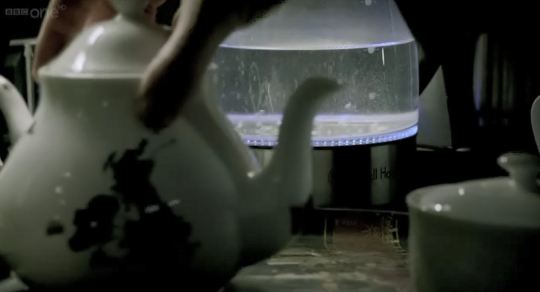
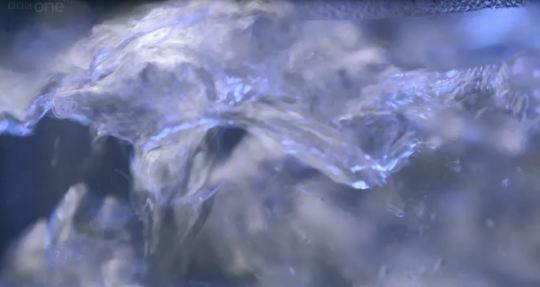
Or Mary showing up in the top apartment of a sky scraper in HLV, knocking out people and wreaking havoc, within the time it takes for John and Sherlock to ascend there with the only elevator. Or Sherlock, when Mary shoots him, having three seconds of consciousness left, and yet he’s able to notice how many minutes it takes for John to get there and call the ambulance. It really doesn’t add up, does it?
We also see and hear these specific elements (along with other, similar examples that I won’t bore you with now) being repeated again and again in the show, in a seemingly haphazardly and meaningless manner. In TSoT we see a sequence from Sherlock’s best man speech where he and John are chased over rooftops by Cupid a short man with a blow pipe. A rooftop is also where Sherlock chooses to meet Moriarty in TRF, and consequently then uses for his fake suicide.
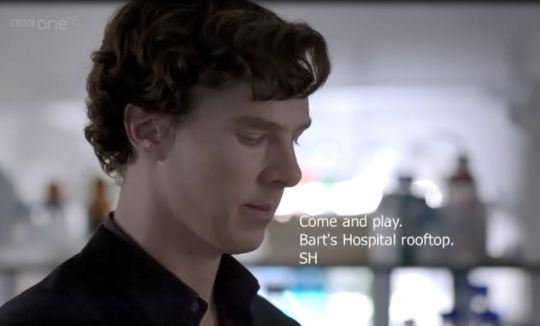
Apparently Sherlock had predicted the exact method of Moriarty’s blackmail from start. But if he knew beforehand, why even put himself in this situation? Couldn’t he thus prevent it? Or is he some kind of oracle that can predict but not interfere with the course of the events? And who was he really planning to con here - Moriarty or John? From the angle they were standing, Jim would have seen the whole theatre from above, had he not opted for a sudden - supposedly unpredicted - suicide on the rooftop. Logic fails when time is twisted here, I believe.
The boiling kettle is mentioned by John in another not too dissimilar context in THoB (thanks for the transcripts, Ariane De Vere X), when Sherlock and John are trying to fake their way into Baskerville’s military facility:
SHERLOCK: What’s the matter?
JOHN: We’ll get caught.
SHERLOCK: No we won’t – well, not just yet.
JOHN: Caught in five minutes. “Oh, hi, we just thought we’d come and have a wander round your top secret weapons base.” “Really? Great! Come in – kettle’s just boiled.” That’s if we don’t get shot.
John is ironic here of course, ridiculing the idea that the military would immediately welcome their intrusion by offering them tea. But this is exactly what Sherlock absurdly does with his arch enemy the very next episode. He even uses precisely the same words: ”Kettle’s just boiled” to greet Moriarty. It’s almost as if he would aim to fulfill John’s ironic ‘prophecy’, isn’t it?
If it was strange in HLV how an unconscious Sherlock could know how long it took for John to find him after he was shot, it’s even weirder in TST to see Mary perform a long speech after being shot. And the way she throws herself in front of the bullet after it has been fired is physically impossible. In real life with a real time frame, she wouldn’t have the time to move, because no human being can move faster than a bullet.
In the show we can also see scenes shifting forwards and backwards in time, where later events are superimposed over former events without any explanation. Like in HLV when John and Mary are being welcomed as Christmas guests at Sherlock’s parents’ house, shown before the trio had even attempted to sort out the horrible event when Mary had tried to kill their son (which they actually didn’t sort out - they were interrupted by Sherlock’s second heart failure).
And in S4 we have these inexplicable ’jumps’ in time where big chunks that would be explanatory for the story line are simply skipped over. What happened, for example, in TST after Mary had ordered John to ”pull over” - did she give birth in the car? Or was little Rosie born on the sidewalk in the middle of London? Or was this just another labour pain after which they could continue to the hospital? We don’t get to know, because suddenly it’s time for the baby shower. Or in TFP, John and Sherlock jump out of an exploding 221B Baker Street in London, but next moment they’re suddenly hijacking a fisher boat out at sea, perfectly unharmed. How did they even get there? And what happened in between? We never get to know.
This is not how you construct a believable story, is it? All in all, time and space are being handled in a very sloppy manner in BBC Sherlock - actually from start, but increasingly so until it gets really absurd at the end of TFP. Which is a bit illogical in a story about a detective where the facts and details are supposedly essential to his crime solving. In this show one can get the impression that time is not a linear chain of events, and space is not even relevant. But maybe it’s all just a matter of perspective?
The space-time continuum
Not so long ago, I saw this post from 2014 on my dash (X), now with an addition by @sarahthecoat (X) which in turn linked to this very interesting meta by @impatient14 (X). The latter is about BBC Sherlock seen from a space-time continuum, a concept which I find truly mind-boggling and very fascinating - thanks for the link, @sarahthecoat! Here’s Wikipedia’s representation of the space-time continuum (X):
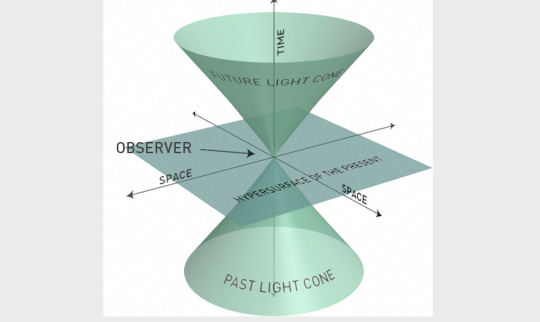
This idea originates from Einstein’s theory of relativity. The speed of light is constant. If space has three dimensions, time can be seen as the fourth dimension. In the representation above, space has been reduced to only two dimensions, leaving the third for time. The observer is placed at an event in Origo (O), the null point where all the time and space axes and the two ’light cones’ of future and past events meet. A signal with equal or less speed than light can travel from O to a position and time within the future light cone. Therefore it’s possible for event O to have a causal influence on this future event. The future light cone contains all the possible events that could be causally affected by O.
Likewise, a signal with equal or less speed than light could have travelled from a position and time within the past light cone to O. The past light cone contains all the possible events that could have had a causal influence on O.
What is real?
But what has this to do with BBC Sherlock? Years ago, we had this really interesting discussion based on a meta by @gosherlocked about ill-treated children in BBC Sherlock (X), where we tried to explore what could be seen as ’real’ events in BBC Sherlock, and what could be seen as purely metaphorical representations. @ebaeschnbliah made a good point explaining how things only happening inside Sherlock’s head would still appear just as ’real’ to him, since every action from a person always starts from within their own brain. I think this idea of a ‘inner universe’ might also be consistent with space-time continuum: within the light cone of possible, future events even absurd things can occur, because in our fantasy everything is possible. So if Sherlock is setting up scenarios within his mind palace, separated from other people’s reality, he might get to absurd conclusions that appear very true to him. And to him the time-line might even seem logical and normal, even if it would appear twisted to an outside observer.
In light of more recent discussions around @sagestreet’s analyses of possible starting points for Sherlock’s extended mind-palace - EMP - (X), I felt inspired to try to apply @impatient14’s idea of the space-time continuum to my own view of this show.
As far as I can see (with my very limited understanding of the topic, because this ’timey-wimey’ stuff is a bit confusing, and a far cry beyond my ’event horizon’ :D) the space-time continuum idea seems to correspond with EMP theory and also with a lot of other stuff we’ve been discussing for the last few years after S4 aired.
However, when it comes to the observer’s point in the space-time continuum, the moment when Sherlock presumably enters his EMP and starts running scenarios of possible future events, I like to see things a bit differently. I’m still inclined to hold on to the ’possibly-raggedy-theory’ as @sagestreet calls it, which places this moment right after John’s wedding.
I have several arguments for this, and some of them involve John’s online blog, which we can all still find on the wayback-machine (X), and also in the mirrored version on tumblr (X). I’ll try to describe my view here, followed by an attempt at argumentation. It might be a bit much to read, but I’ll do my best to point out the main components, so please bear with me 😊. But first of all I recommend you to read @impatient14 ’s space-time meta (X).
Weiterlesen
217 notes
·
View notes
Text
@thepineapplering In response to your tags, I would directly compare the messages/information about the black pearl to John’s note… both “showed up” in that sense. What has us most worried is the content of the note.
In the texts, we learn that there’s a big search on for the black pearl, and we learn that it’s linked to Georgia (where AGRA attacked the embassy). This is our second link between the black pearl and Mary: in Sherlock’s deduction of Mr Kingsley, he refers to Mrs Kingsley as an assassin named Greta (= pearl).
Also, more to the point, Sherlock literally can’t tell the difference between the black pearl and AGRA.
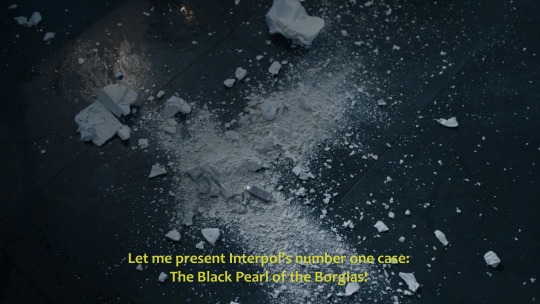
And, as you point out, Mycroft has the black pearl on a chain, likely indicating his control over AGRA.

Back to Sherlock doing research in the cab, the heading for all of this information is “WHAT HAPPENS NEXT?” and as he finishes reading, Sherlock smiles.
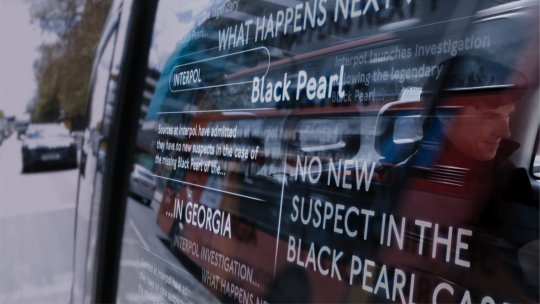
It’s natural to think the Interpol texts are simply foreshadowing for Sherlock and John’s pursuit of Mary to Morocco… but then why the parallels between the texts and John’s (paper) note?
When Sherlock reads John’s note, the shots are framed in exactly the same way as they were when he was reading about the black pearl; it’s almost as if they used the same shots and changed the backgrounds. This suggests to me that the content of John’s note involves Mary in some way.
The only difference between these scenes is that in the “facing left” shot, Sherlock lifts his head after reading the note, to look into the distance…
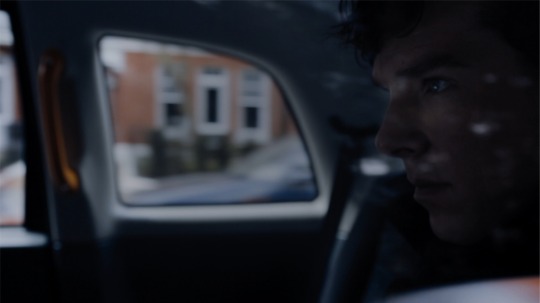
… and we don’t see him smile at the end.

Does that mean he had nothing to smile about? Or did we cut away too quickly?
In other words… what happens next?
57 notes
·
View notes
Text
in thousands of fics about John and Sherlock kissing for the first time, when Sherlock asks if they can continue, John without fail responds “Oh god, yes” further proving the point that the initial utterance of this phrase in canon media was inherently sexual. In this essay I will
321 notes
·
View notes
Text
“You can’t arrest a jellyfish!” (Sherlock)
I know there are several other really cool theories on the meaning of the jellyfish theme in TST. I just thought I would like to try my hand at an alternative explanation, so here goes…
Something which I have never seen anyone mention before (please correct me if I’m wrong, but I genuinely think this has never been brought up by anyone before) is the fact that jellyfish could someday be used as a model for artificial hearts and researchers are already working on that.
If you don’t believe me, look at this: This guy here (x) had this fantastic idea AT AN AQUARIUM of all places. Ahem…
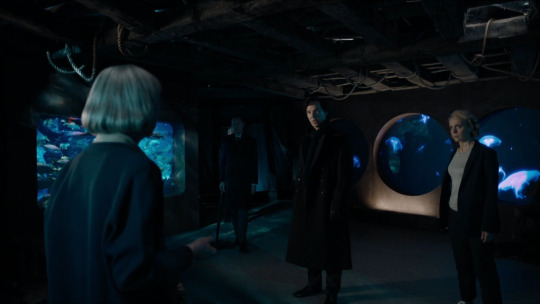
…this fantastic idea to model artificial hearts after jellyfish.
So, is it a coincidence that Sherlock and John talk about jellyfish a few seconds after the words “The Cardiac Arrest” flash across our screens?
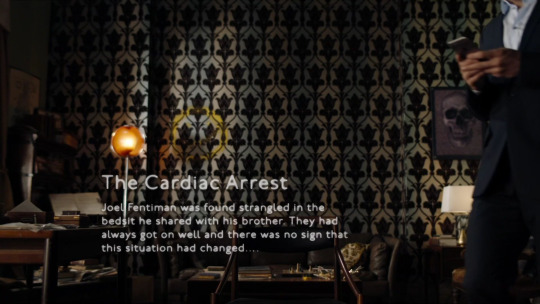
I mean, consider this: If Sherlock is indeed in a coma, as I and many others have proposed again and again, if s4 is completely in his head, then this could be really, really significant: Sherlock can probably hear what people around him at the hospital are saying. He can hear them discuss medical concepts (I have talked about this before here: x).
If “The Cardiac Arrest” refers to his (Sherlock’s) cardiac arrest, then some doctor discussing artificial hearts whilst standing right next to Sherlock’s hospital bed in the coma ward would make all the sense in the world.
Also, look at the wording here: “You can’t arrest a jellyfish.”
I know that, on a detective show, we have the inclination to interpret words like “arrest” to mean something like “to be send to jail”, but what if that’s not what “arrest” means?
What if it’s word play? Mofftiss like themselves a good pun. And the words “The Cardiac Arrest” can be seen flashing across the screen just a few seconds prior to the jellyfish comment.
What if the word “arrest” in “You can’t arrest a jellyfish” is not about putting someone in jail? What if it means “to stop” something? Something like a heart. A cardiac ARREST is when the heart stops, which a lot of us have speculated means Sherlock’s heart stopped at some point (in reality, outside of his coma dream).
Well, and the advantage of an, ahem, “jellyfish” (=artificial heart) is that it can’t just be stopped like that. It won’t just give out. It keeps beating. “You can’t arrest a jellyfish!” = “An artificial heart doesn’t just stop on you.”
Have we ever considered that? The repeated use of the word “arrest” over that short period of time seriously seems to point in that direction.
And remember: We have already established that not long after that, Sherlock is on some sort of heart assist system (see my meta on this here: x) because his phone (=heart) speaks with the voice of on assistant.
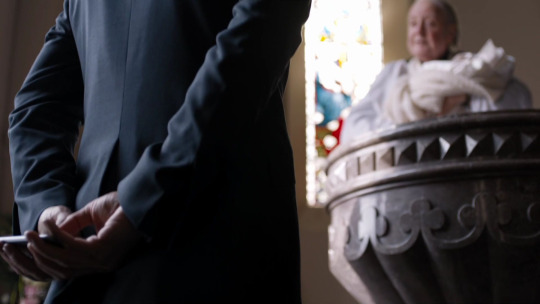
We have also established that Sherlock was probably put on a balloon pump because John (=Sherlock’s heart) was replaced with a balloon (see my meta on this here: x).
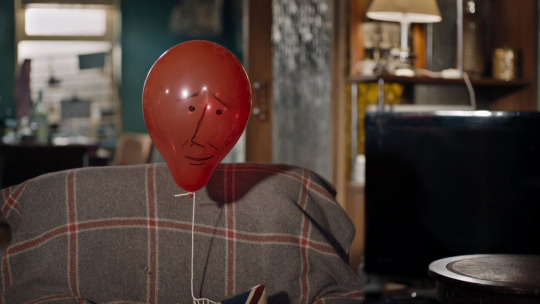
Aaaand there’s also the evidence of ‘Doctor Who’ s10, in which Bill (=a major Sherlock!mirror Moffat just wrote in there to eff with us:P) is put on a rather bulky type of artificial heart, see here:
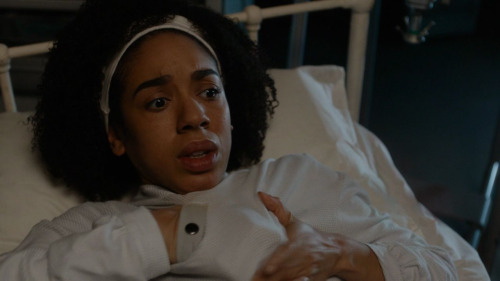
So, why wouldn’t we assume that the mention of the jellyfish following so soon after the words “The Cardiac Arrest” refers to exactly that: an artifical heart. And why wouldn’t we assume that the repeated use of the word “arrest” means the exact same thing in both instances?
And now go and read (x) about that brilliant guy who came up with the ‘jellyfish’-type of artificial heart at an aquarium of all places.:D
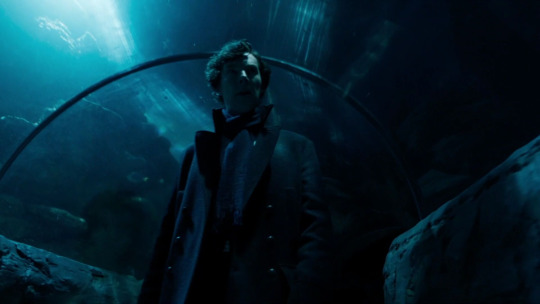
Note: I know there are at least two very cool other explanations for the jellyfish theme in TST: one by the lovely @ebaeschnbliah on ‘Aequoria Victoria’ and another one by the great @devoursjohnlock on how the jellyfish theme ties back to ACD!canon in “The Lion’s Mane”. I just wanted to bring up an alternative explanation, which might be worth considering, as well.
All screencaps taken from: kissedthemgoodbye.net
This is my corner on AO3 where I scream about Sherlock being in a coma: Here.
Tags: @ebaeschnbliah @possiblyimbiassed @sarahthecoat @sherlockshadow
@raggedyblue @gosherlocked @monikakrasnorada
71 notes
·
View notes
Photo
She hasn't got a dog, she's got a pussy.
In my mind I can see Cat Lady Molly and Jim (playing it straight) just standing there, smiling and waving.



605 notes
·
View notes
Photo
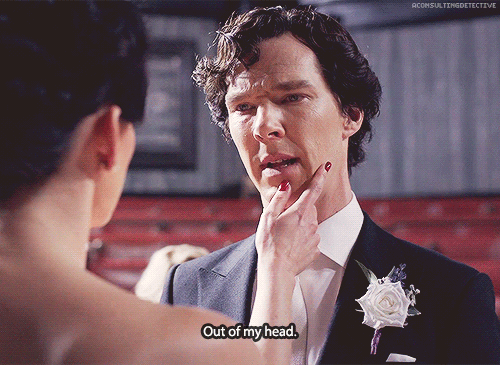
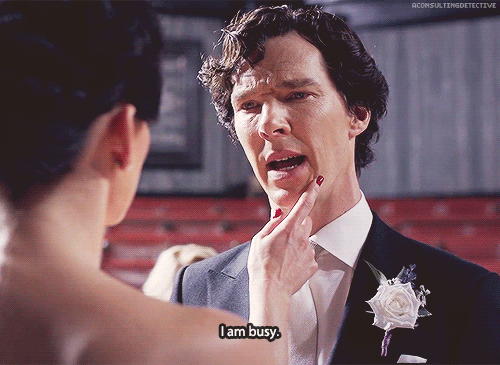
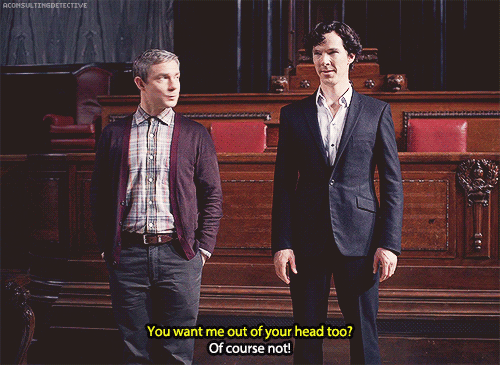

Legit Johnlock Scenes
John’s always allowed in Sherlock’s mind palace (and everywhere else).
10K notes
·
View notes
Note
Oh it's smart, and they're self proclaimed assholes. I can't remember the exact terminology but they'd out themselves as asses all the time.
They like the game too much to give it away.
"Nobody but us cares." The fact that people get peeved when you imply a show about a famous DETECTIVE might be leaving CLUES for the viewer is one hell of a Catch-22. It's like: "Wow this show is so intelligent and I love the deductions, but also there's no reason to assume the showrunners included any symbolism or coding whatsoever they're too dumb for that."
Yeah, right??? I’ll never get the reasoning that trying to piece together clues on a detective show was a crazy thing to do
61 notes
·
View notes
Text
The Six Thatchers blog entry is the neatest representation of where I’m at right now. They could have done literally any other historical figure for an adaptation of The Six Napoleons. But they picked Thatcher again. It would be so easy for literally any character to say “haven’t we already done this” and hand wave it away with some “the wheel turns nothing is new” nonsense. But it goes completely unacknowledged.
So the two explanations I can come up with for that are that they are hoping no one notices or calls them out on it because it was only on screen for a few seconds and on a website that nobody but diehard fans actually read. Seems to have worked, I haven’t been able to find any evidence of the blog entry being brought up in an interview. Nobody but us cares. But that also has horrible ramifications for the structural integrity of the show, that those sorts of background details along with the blatant stuff on the blogs just doesn’t matter, right?
Or they know what they’re doing. And you’re meant to notice that this is poking a giant hole in the continuity of the show and examine the other things in this season that are deliberately breaking the diegesis. They picked the blog entry that had Sherlock and John locked in 1895, wrote an episode around it in which John and Sherlock barely speak to one another, an episode where their entire relationship centers around Mary and breaks without her, and are daring you to notice and call them on it.
36 notes
·
View notes
Text
John pretending to like the overly sugared nasty ass coffee that Sherlock makes for him is the sweetest tenderest little act of love I have ever seen
244 notes
·
View notes
Text
Winter Light
This is a hermetic universe, which for a few minutes a day has only two inhabitants. They don’t even need names.
They wouldn’t want to live always in such isolation, but in the winter light, when time cracks open, there are always—only—two of them.
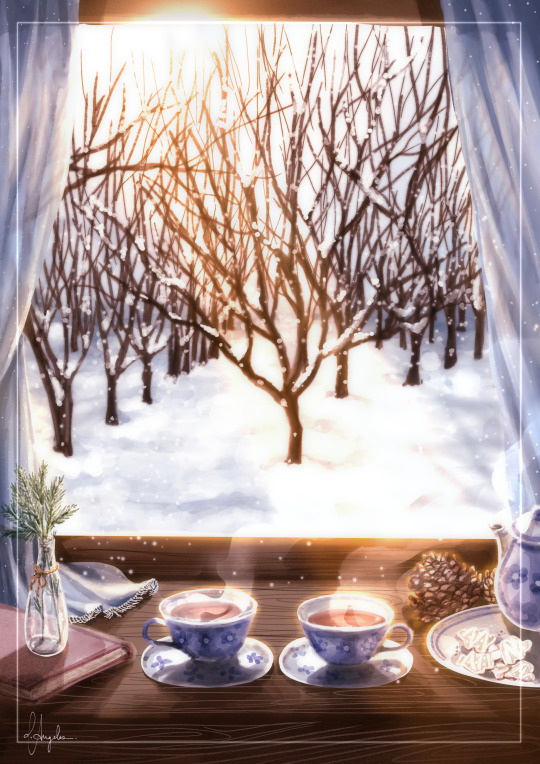

⭐Commissions for @totallysilvergirl!⭐
I’ve had the absolute privilege (again) to be commissioned by the one and only @totallysilvergirl for her beautifully poetic Johnlock fic named Winter Light, from her series Drawn to Stars.
This is my first go at trying landscape-oriented artworks; I made two!! :D
I was really nervous at first but I’m really happy with how they turned out, especially when the author herself has been so encouraging through the process. Silvergirl, you are an absolute star!!
I’ve tried my best to emulate the essence of the story, so if these pieces speak to you, fellow johnlock stan, you should definitely check out her fic; hell, check out everything she’s written!
[While you’re at it, do have a look at this other sherlock commission I did for @totallysilvergirl]
.
If you like my work, you can support me on kofi here <3
.
.
.
@camphipp @athene-noctua08 @sherlockedcarmilla @enterthetadpole
128 notes
·
View notes

